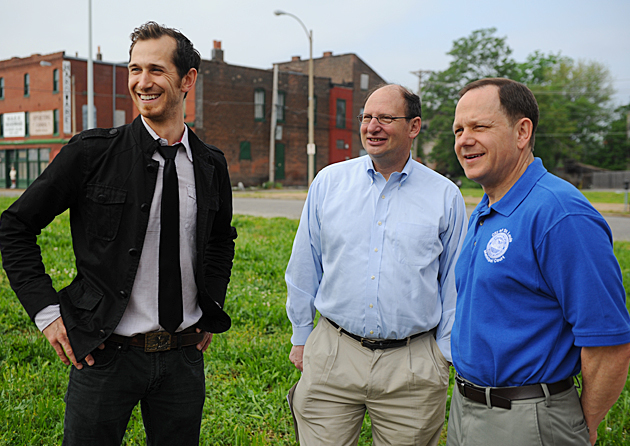
The City of St. Louis is poised to lead the way in innovative solutions to the national urban issue of vacant land, thanks to a unique partnership with Washington University in St. Louis. Four of the city’s vacant lots will be home for five demonstration projects testing new ways to think of vacant space.
With projects as varied as a franchise-model urban farm co-existing next to an intimate bistro built out of re-used shipping containers, and a sunflower lab piloting efficiency of plant-based soil remediation, Old North St. Louis will be the first home to what truly will be a “sustainable land lab.”
Winners of the inaugural Sustainable Land Lab Competition are as follows:
• Bistro Box and Our Farm: The Bistro Box concept is a small-business incubator that transforms surplus cargo containers into a compact restaurant and culinary destination. Our Farm is a scalable urban agriculture network that proposes to transform blighted lots into cost-efficient models of sustainability. (This is a hybrid of two finalist teams sharing a single lot due to the synergy between the two projects.)
• Chess Pocket Park: The Chess Pocket Park is an outdoor community chess venue for residents with a permanent location supporting our primary community asset — people.
• Mighty Mississippians: This land lab is a modern agricultural and sustainable living model, the premises for which are rooted in regional history, the Mississippians and their ancestors, as well as modern permaculture practices. Using concepts of permaculture, the site will demonstrate the interdependent relationships that work efficiently and sustainably in nature and that worked for previous civilizations, from the soil to the birds, to humans.
• Sunflower+ Project: This project proposes turning previously developed urban lots into a community asset through the planting of sunflowers. With a goal of eventually spurring redevelopment of these vacant parcels, the project will serve as an appropriate, scalable and productive transitional solution. The sunflowers will improve soil quality, remove soil contaminants and eventually produce a marketable set of products from flowers to seeds to biodiesel.
“From urban to suburban to rural communities, vacant land is an American epidemic. This competition is adding to … the body of problem solving. The aspect that makes it unique is that the winners will … win land and money to build their idea.”
— Phil Valko, director of sustainability, Washington University
Each winning group receives a two-year land lease and $5,000 seed money to start their project.
“The Sustainable Land Lab Competition is exploring innovative ideas for a national issue,” says Phil Valko, director of sustainability at the university. “From urban to suburban to rural communities, vacant land is an American epidemic. This competition is adding to the dialogue and the body of problem solving. The aspect that makes it unique is that the winners will actually win land and money to build their idea. The partnership between the city and Washington University in St. Louis is of great benefit to both. It leverages the university’s role as a thought leader and research institution to channel creative thinking to a major challenge the city faces.”
The competition timing aligns well with the release of the first City of St. Louis Sustainability Plan.
“Advancing tangible and measurable sustainability has been an important goal of this project,” says Catherine Werner, sustainability director for the City of St. Louis. “Part of the challenge was for the teams to specifically address how their projects will help achieve the city’s sustainability goals. It’s very exciting to now have the opportunity to watch as creative sustainability ideas become reality.”
“I am thrilled that we have been able to partner with Washington University on this project,” says St. Louis Mayor Francis Slay. “There was an overwhelming amount of interest and support from the community, and the result was a high level of energy and an impressive array of final project ideas. It was difficult to select just a few winning projects. I look forward to celebrating the winning projects and using ideas from all the projects involved to address vacant land use in the city.”
Forty-eight teams applied in the first of a three-round competition. The final round consisted of eight ideas representing 10 of the original teams.
The Sustainable Land Lab is a partnership between Washington University and the City of St. Louis, with support from Old North St. Louis Restoration Group, Equifax and the Regional Housing and Community Development Alliance.
It is the ongoing legacy of Washington University’s three-day Sustainable Cities Conference, held Nov. 1–3, 2012. The Sustainable Land Lab is designed to be a living laboratory of two-year demonstration projects, which will showcase innovative ideas and integrated strategies for transforming one of the region’s greatest challenges — vacant land — into an asset that can advance sustainability.
Neil Schoenherr is senior news director in the Office of Public Affairs.
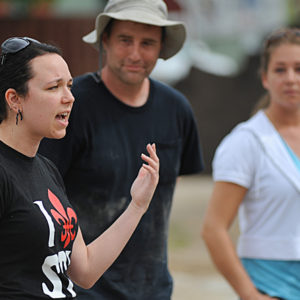
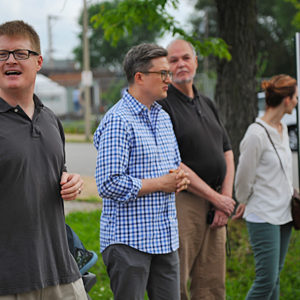
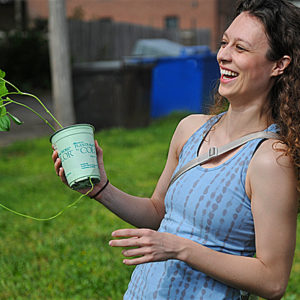
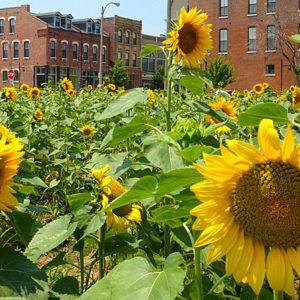
Comments and respectful dialogue are encouraged, but content will be moderated. Please, no personal attacks, obscenity or profanity, selling of commercial products, or endorsements of political candidates or positions. We reserve the right to remove any inappropriate comments. We also cannot address individual medical concerns or provide medical advice in this forum.